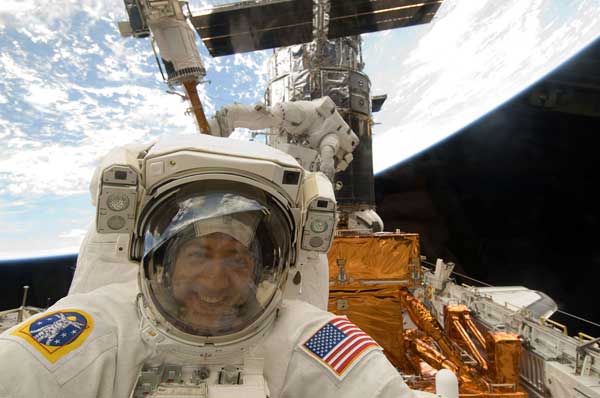Would you go into space if you knew your bones would turn into something called “pee brittle”? Dr. Michelle Thaller explores the effects of space on the human body.

NASA
Nothing in our lives is more pervasive than gravity. We can shield our senses from the effects of light, sound, or any other sort of input, but there is no way to shield ourselves from the downward tug of the Earth’s gravitational field. Our bodies evolved to function well in gravity; our bones support us, our muscles strain against it, even our organs sit in positions that respond to the pull of gravity. Venturing into space and away from the presence of gravity is not something that evolution prepared our bodies or our minds to do.
At first, people wondered if astronauts in space would be able to eat and digest food (they can), or if their blood would flow properly (it does, for the most part). That much was comforting; maybe this wouldn’t be so hard, after all. Heck, watching the astronauts in space, it sure looks like a lot of fun to be able to fly around the capsule like Superman.
But what happens in the long run? If humans are ever going to undertake significantly long journeys away from the Earth, we’d better be very clear about what impact living away from gravity, or in reduced gravity (like on the Moon or Mars) is going to have on our bodies.
Luckily for us, we have an absolutely amazing tool to learn more about how to live and work away from gravity: the International Space Station. It sort of boggles my mind that we’ve had people in space, continuously, for more than 16 years now. And last year, Scott Kelly and Mikhail Kornienko spent a year in space together — a year filled with every poke and prod and medical experiment they could do up there to try to nail down exactly what was happening to their bodies over time.
To make matters even more interesting, Mark Kelly, Scott’s twin and also an astronaut, stayed on the ground but volunteered to be subjected to the exact same experiments as a control sample. The data taken from these people will be invaluable in planning a journey to Mars, where astronauts will be required to make a journey of six months or more, then arrive strong, healthy, and ready to begin setting up habitats and begin exploring the red planet.
In this episode of Orbital Path, we talk to two people who are intimately involved with learning how human bodies respond to the lack of gravity:
Dr. Mike Massimino is an astronaut who flew in space twice to service the Hubble Space Telescope. He knows exactly what it feels like to be falling continuously around the Earth for weeks at a time.
Dr. Jennifer Fogarty stays put on the ground, but as the Deputy Chief Scientists for NASA's Human Research Program, it’s her job to figure out all the subtle ways microgravity changes our bodies, and our minds.
NASA anticipated some challenges: maintaining bone mass is a problem, and astronauts work out for hours every day to keep their muscles strong. But some things were unexpected, like degraded vision and a higher likelihood of kidney stones. Other issues seemed trivial at first, but they might wear down morale over long periods of time: how would you like to feel like you have the flu, or to not be able to taste your food for months on end?
So living and working in space isn’t so easy after all. Right now, we are honestly not sure how to get people all the way to Mars and keep them healthy. But it’s not time to get discouraged; it’s time to learn everything we can. We are getting better all the time at keeping our bodies working well in space, and we will be armed with that knowledge, someday, when we arrive on the surface of Mars. And above your head right now, careening around the Earth once every 90 minutes, is the laboratory filled with the amazing people that will get us there.
Orbital Path is produced by PRX and supported by the Alfred P. Sloan Foundation. Don't miss PRX's other science podcasts: Transistor and Outside Magazine.
 0
0
Comments
You must be logged in to post a comment.